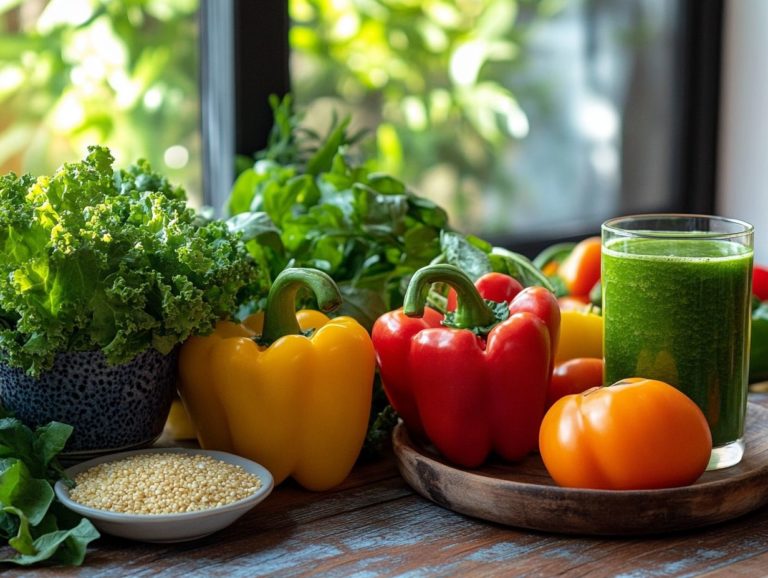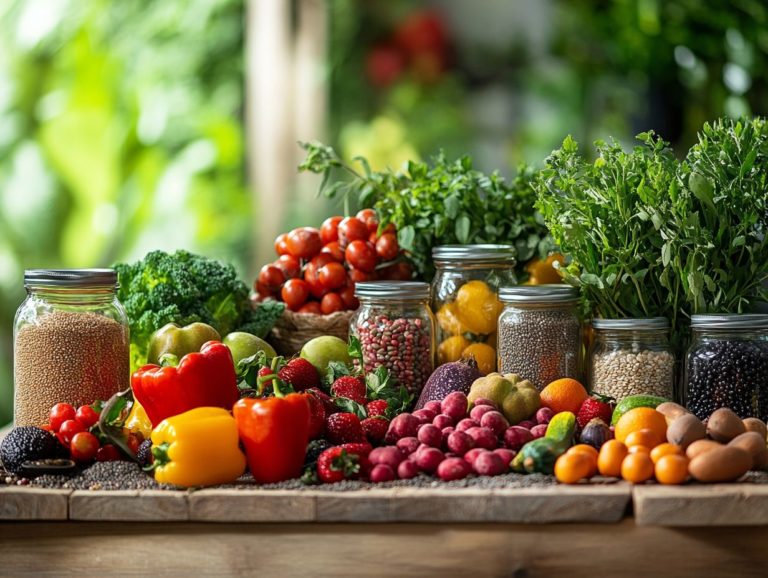What Is the Importance of Local Foods?
In our busy lives, we often overlook local foods. Yet, they are vital for healthier eating and a sustainable lifestyle.
Get ready to explore the amazing world of local foods! This article delves into their myriad benefits, including nutritional, environmental, and economic advantages.
You ll discover practical tips for weaving local foods into your diet, ways to support local farmers and producers, and the common challenges you might encounter.
By embracing small changes, you’ll see how they can lead to significant impacts on your health and the community around you.
Contents
Key Takeaways:
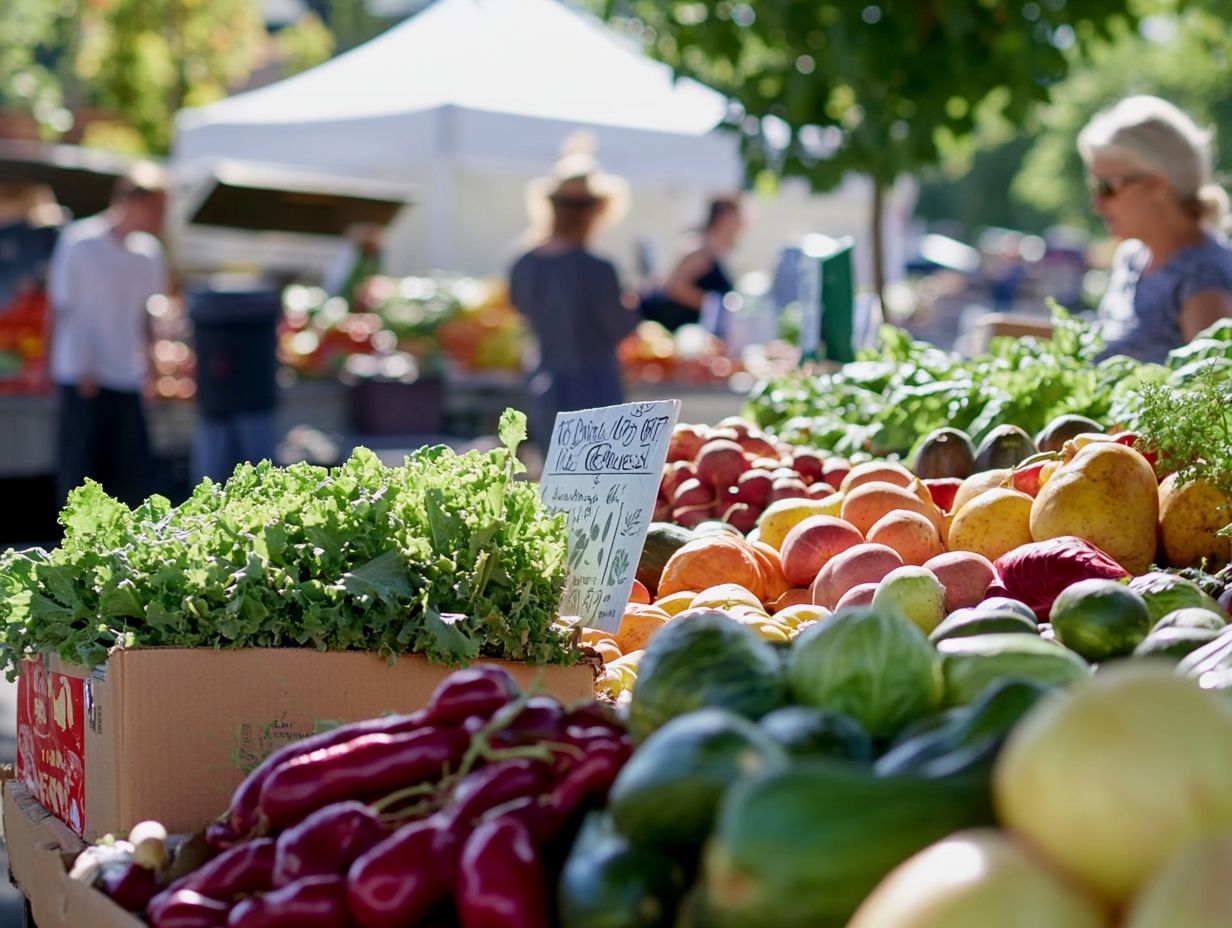
- Eating local foods boosts your health because they are fresher and more flavorful.
- Choosing local supports our economy and reduces our carbon footprint, as local foods require less transportation and packaging.
- Incorporating local foods into your diet can be easy visit farmers’ markets, join community-supported agriculture programs, and learn to cook with seasonal produce.
Understanding Local Foods
Local foods are key to building a sustainable food system. They help your community thrive and support local farmers who use eco-friendly farming methods.
The local food movement highlights the importance of seasonal produce and rich in nutrients options, which enhance food safety and health benefits. Embracing local eating fosters community connections and contributes to a more resilient food supply chain.
Defining Local Foods
Local foods are products that are grown, harvested, and sold within a specific geographic area, usually within 100 miles of where you consume them. This proximity emphasizes freshness and strengthens your connection to the sources of your food.
Engaging with local foods often means joining a vibrant community, where farmers markets and local co-ops showcase regional produce. Seasonal availability is key; when you choose foods that are in season locally, you enjoy superior flavors and support sustainable agricultural practices.
By prioritizing these elements, communities can cultivate an atmosphere that honors local traditions, minimizes carbon footprints, and fosters diverse agricultural approaches.
Benefits of Eating Local Foods
Eating local foods provides numerous benefits that enhance your health, support the environment, and invigorate the local economy, creating a win-win scenario for consumers and producers.
When you prioritize locally grown food, you gain access to fresher produce, filled with nutrients and flavors that outshine non-local options.
Nutritional Benefits
The nutritional advantages of indulging in local foods are substantial. Local foods often have higher levels of antioxidants and essential nutrients compared to items transported long distances.
When you savor seasonal produce harvested at its peak ripeness, you re treated to optimal flavor and a wide range of vitamins and minerals crucial for your health. Eating fruits and vegetables in their prime ensures your body receives maximum nutrition, enhancing immune function and promoting overall well-being.
Local foods are often grown with great attention to detail, allowing them to retain their freshness and taste. By choosing local options, you not only enjoy superior flavors but also contribute to local economies and reduce your carbon footprint. This choice supports a more sustainable lifestyle that aligns beautifully with your commitment to healthy living.
Try visiting your local farmer’s market this weekend and taste the difference!
Environmental Benefits
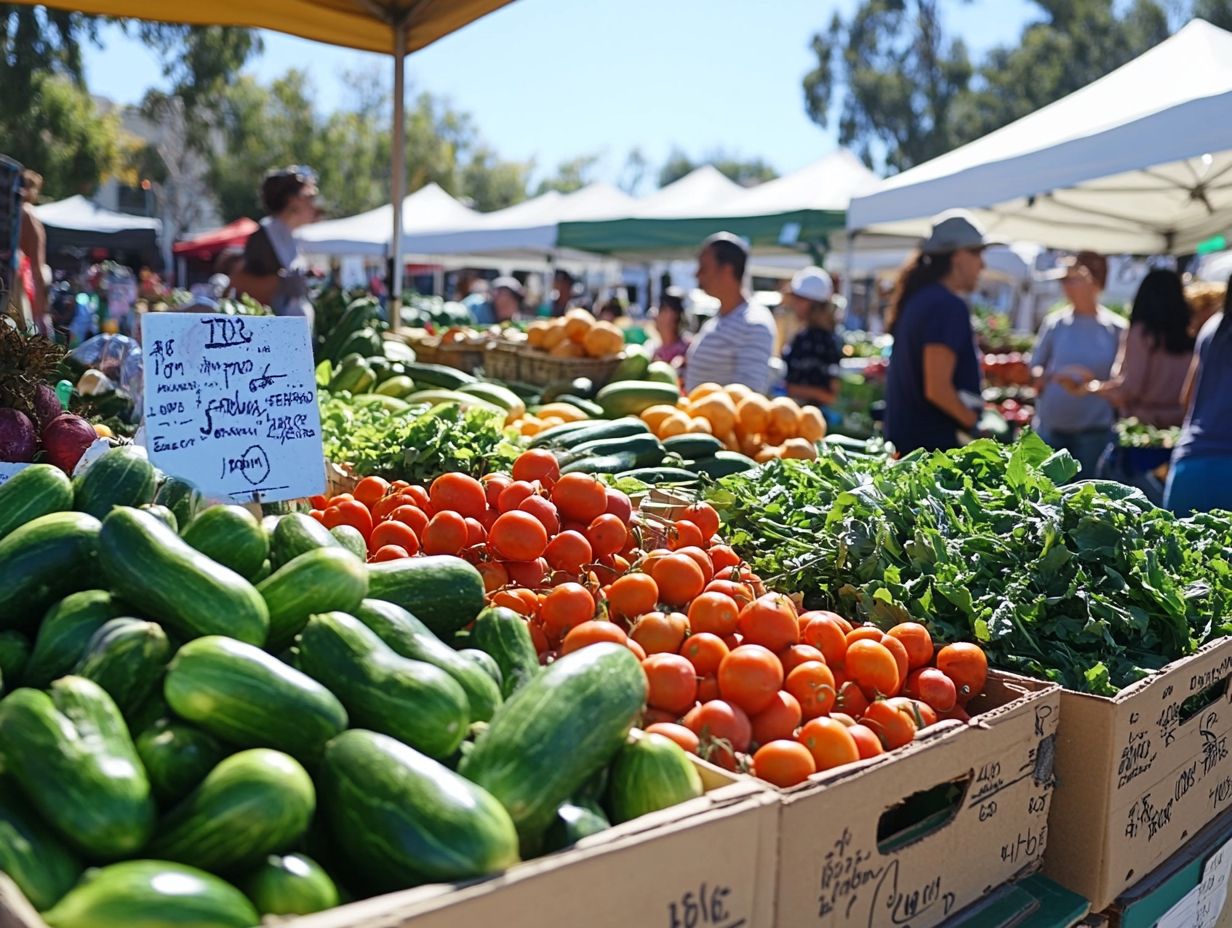
Eating local foods greatly reduces food miles and lowers carbon emissions from transportation. This offers significant environmental benefits.
When you choose local foods, you strengthen community ties and promote sustainable agricultural practices that enhance biodiversity. Supporting local food systems actively helps farmers who use eco-friendly methods, improving soil health through organic farming and crop rotation.
This not only minimizes the need for chemical fertilizers and pesticides but also nurtures a thriving ecosystem that supports diverse plant and animal life. Your commitment to local food consumption is a powerful vehicle for environmental stewardship. It creates a ripple effect that benefits both you and the producers around you.
Economic Benefits
The economic advantages of choosing local foods are remarkable. They provide vital support to local farmers and strengthen community food systems, invigorating the local economy.
When you buy these locally sourced products, you keep money circulating within your community. This choice enriches local farms and generates job opportunities for farmers, bakers, and artisans who need help to meet sustainable demands.
As more people decide to buy from local vendors, the community becomes more resilient. It reduces reliance on external markets and is better equipped to handle economic fluctuations. Conscious consumerism fosters community pride and promotes sustainable practices that benefit the environment.
How to Incorporate Local Foods into Your Diet
Incorporating local foods into your diet is easy and enjoyable! Explore farmers markets, join a Community Supported Agriculture (CSA) program, and seek out seasonal produce.
These choices not only elevate the freshness of your meals but also enhance their quality, creating a culinary experience that is both delightful and nourishing.
Tips for Finding and Preparing Local Foods
Finding and preparing local foods can be a delightful experience. Visit a farmers market, research local farms, or follow seasonal produce guides to access the freshest options.
Many communities have vibrant farmers markets showcasing diverse produce and connecting you with local growers. Check out online farm directories to find farms offering seasonal subscriptions or pick-your-own experiences that deepen your appreciation for what you eat.
To savor the freshness and flavors of local ingredients, use simple preparation techniques like steaming or saut ing. These methods preserve taste and nutritional value. Incorporating herbs from your garden or local vendors can elevate your dishes, making them healthier and a pleasure to enjoy.
Supporting Local Food Systems
Supporting local food systems is crucial for nurturing sustainable practices, enhancing community resilience, and ensuring the success of local farmers who are vital to our food supply.
By investing in these systems, you empower local producers and create a vibrant community that thrives on its own resources.
Ways to Support Local Farmers and Producers
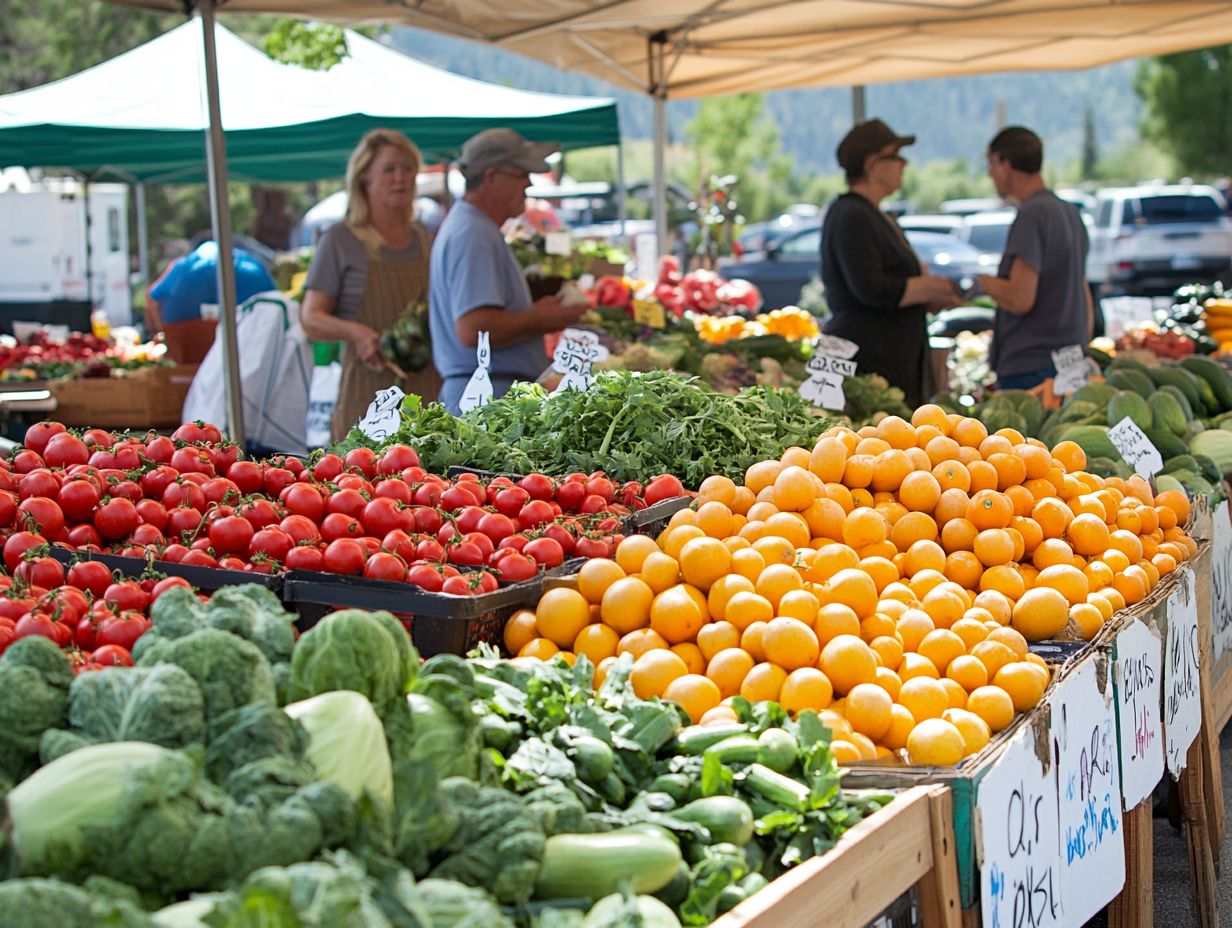
There are many ways to support local farmers. Buy fresh food directly at markets or join community-supported agriculture (CSA) programs. These programs allow consumers to buy shares of a farm s harvest in advance.
Beyond simply purchasing fresh produce, you can take proactive steps to strengthen your local agricultural community. Volunteering at nearby farms not only provides you with hands-on experiences but also enhances the relationship between farmers and the community.
Another powerful action you can take is to raise awareness about the significance of local farming through social media campaigns or community newsletters. Your efforts can inspire others to follow suit and make informed choices.
Why not organize fun community events like farm-to-table dinners or local harvest festivals? These gatherings foster a sense of togetherness and create a vibrant ecosystem that benefits both consumers and producers.
These initiatives underscore the essential role agriculture plays in cultivating sustainable food systems and reinforcing community connections.
Challenges and Solutions for Eating Local
While the advantages of eating local are plentiful, you may encounter challenges like accessibility, seasonal availability, and potentially higher prices that could make you hesitate to make the switch.
Nevertheless, there are effective solutions available to help you navigate these obstacles.
Overcoming Barriers to Eating Local
Overcoming barriers to enjoying local foods often calls for a blend of education about the benefits, community support, and collaboration between local producers and consumers.
To enhance access to local foods, consider initiating educational workshops that showcase the nutritional advantages and environmental benefits of supporting local agriculture. Communities can establish farmers’ markets, providing residents with an opportunity to purchase fresh produce while also creating vibrant gathering spots for sharing knowledge and experiences.
Building networks between local farmers and consumers can pave the way for exchanging valuable information about seasonal produce and sustainable practices. Integrating school programs can teach children about gardening and nutrition, cultivating a new generation of informed consumers and fostering a long-term commitment to local food systems.
Frequently Asked Questions
What Is the Importance of Local Foods?
The importance of local foods lies in its benefits for both individuals and communities. By consuming locally sourced foods, individuals can support the local economy, promote sustainable farming practices, and have access to fresher and more nutritious options.
Why Should I Choose Local Foods Over Imported Ones?
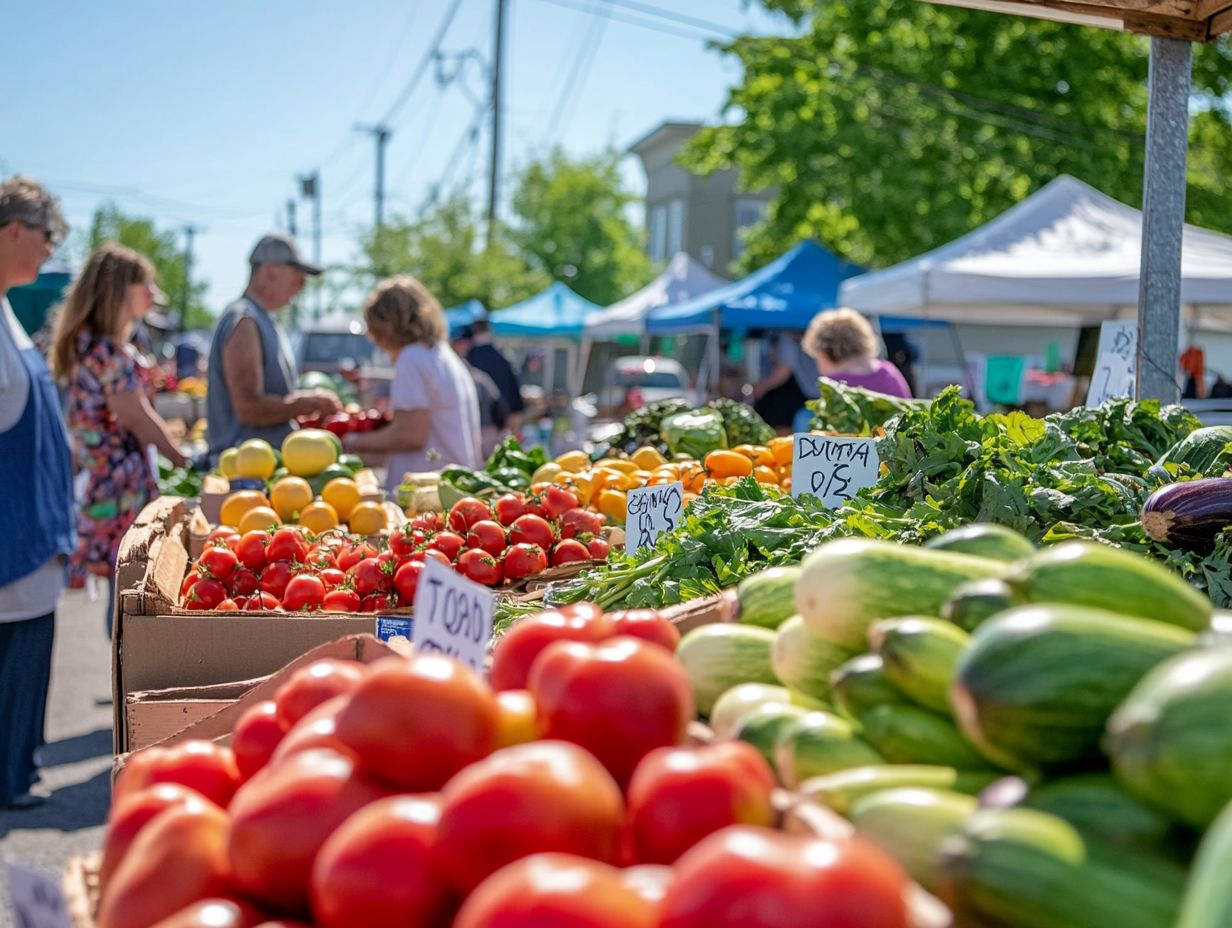
Choosing local foods over imported ones not only supports the local economy but also reduces carbon emissions from transportation and promotes food sovereignty. Local foods are also typically fresher and have a smaller environmental impact compared to imported ones.
What Are the Benefits of Eating Local Foods?
Eating local foods has numerous benefits, including increased nutrient content, better taste, and reduced carbon footprint. It also supports local farmers and promotes a sense of community by connecting people to their food sources.
How Can Eating Local Foods Help the Environment?
Eating local foods can help the environment in several ways. By reducing transportation emissions, promoting sustainable farming practices, and preserving local farmland, it contributes to a healthier and more sustainable food system.
Where Can I Find Local Foods?
Local foods can be found at farmers’ markets, community-supported agriculture programs, and grocery stores that prioritize sourcing from local producers. You can also directly purchase from local farms or grow your own food in a backyard garden or community garden.
Are Local Foods More Expensive Than Imported Ones?
Local foods may seem pricier at first. But think about it! When you factor in the environmental and community benefits, they can save you money over time.
Buying directly from farmers can often get you better prices than your local grocery store.



